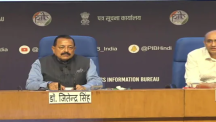Snapshot
India- Soaring Towards a $300 Bn BioEconomy
India is among the Top 12 destinations for biotechnology worldwide and 3rd largest destination for biotechnology in Asia Pacific. India’s BioEconomy has crossed an estimated $130 Bn in the year 2024 and has witnessed a many fold increase in valuation in the past eleven years, with COVID-19 giving the industry a much-needed push. Today, India is poised as one of the leading destinations for bioinnovation and biomanufacturing, and hence is identified as a sunrise sector and a key part of India’s vision of reaching a $5 Tn Economy by 2024. India’s Biotechnology sector is categorised into Biopharmaceuticals, Bio agriculture, Bio IT and Bio Services.
Biopharmaceuticals: India is one of the biggest suppliers of low cost drugs and vaccines in the world. India also leads in biosimilars, with the most number of biosimilars approved in the domestic market.
Bio Agriculture: With nearly 55% of Indian terrain under agriculture and allied activities, India is one of largest producer of Bt-Cotton and has the 5th Largest Area of Organic Agriculture Land globally. BioAgri, consisting of Bt Cotton, pesticides, marine biotech, and animal biotech has the potential to nearly double its BioEconomy contribution from $10.5 Bn to $20 Bn in 2025.
Bioindustrial: The application of biotechnology to industrial processes is transforming manufacturing and waste disposal across the country.
Bio IT & Services: India offers a strong capability in contract manufacturing, research and clinical trials, and is home to the most US FDA approved plants globally outside of the US.
- Forecasted to reach $150 Bn by 2025, and $300 Bn by 2030 with a CAGR of ~17%
- 6000+ Biotech Startups to grow up to 10,000+ by 2025
- 760+ Biotech Companies
- 800+ Biotech Products and Technologies supported
100% FDI is allowed under the automatic route for greenfield pharma.
100% FDI is allowed under the government route for brownfield pharma. Up to 74% FDI is under automatic route and beyond 74% is under the government approval route.
FDI up to 100% is allowed under the automatic route for the manufacturing of medical devices.
For further details, please refer FDI Policy
- +
Bio-incubators
- $ Bn
Expected revenue generation from vaccines by 2025
- +
Core Biotech Companies
- +
Employment Generated
Largest Supplier of DPT, Measles and BCG Vaccines
Developed World’s First DNA Vaccine Against COVID-19
World's 2nd highest number of USFDA Approved Manufacturing Plants Outside the USA
- Industry Scenario
- FOREIGN INVESTMENT
- INDUSTRY TRENDS
- POLICIES & SCHEMES
Industry Scenario
Valued at $137 Bn in 2023, the Indian Bioeconomy Industry is targeted to reach $150 Bn by 2025 and $300 Bn by 2030.
The growth of the Indian biotechnology sector is fuelled by rising demand at both a domestic and international levels. The rise in domestic demand is fuelled by intiatives such as Aatmanirbhar Bharat and Make In India, while overseas demand for Indian vaccines and biopharmaceuticals is due to the globally competitive efficacy of Indian products. India exports vaccines to over 150 countries and is a leading destination for contract manufacturing and clinical trials. In order to contain healthcare costs, companies are leveraging generics and biosimilars, and India has poised itself as a hub to deliver affordable access to innovative and inclusive healthcare solutions. India has about 3% share in the global biotechnology industry.
India has the 5th largest area of organic agricultural land. To promote sustainable agricultural practices and innovation in Agri technologies, Department of Biotechnology has funded 51 Biotech-KISAN (Biotech Krishi Innovation Science Application Network) hubs connecting Indian farmers with best scientists and institutions, empowering farmers, especially women farmers with information on soil health, irrigation, and new Agri-technologies. 44 hubs have been set up in 15 Agro-climatic zones of the country and are conducting activities in 169 districts.
Under the Union Budget 2023, the government announced - "500 new ‘waste to wealth’ plants under GOBARdhan (Galvanizing Organic Bio-Agro Resources Dhan) scheme to be established for promoting circular economy". These will include 200 compressed biogas (CBG) plants, including 75 plants in urban areas, and 300 community or cluster-based plants at total investment of INR 10,000 Cr. Over the period from 2018 to 2022, a total of 22 mergers and acquisitions (M&A) deals have occurred in the life sciences sector in India, with a combined value amounting to $4.6 Bn.
The percentage share of the biotechnology segments is:
-
BioPharmaceuticals- 62% ( $57.5 Bn)
-
BioAgriculture- 13% ( $11.5 Bn)
-
BioIndustry- 15% ( $14.1 Bn)
-
BioIT & BioServices- 10% ( $9.3 Bn)
GROWTH DRIVERS
Demographic Advantage
1Mn+ Skilled Biotech Workforce. Pan India Star College Mentorship Program by DBT.
Infrastructure
74 Bio-incubation Centers created through DBT-BIRAC and 4 Industry Clusters in Kalyani, Pune, Bangalore, Delhi NCR.
Government acting as an enabler to improve EoDB
Critical Policy initiatives such as 'Make in India’, ‘Startup India’, ‘Atmanirbhar Bharat Abhiyan’ (boosting domestic manufacturing capacity) and formulation of the National Biotechnology Development Strategy 2021-25.
Focus on Research & Development
Favorable Government Policies like Draft R&D Policy 2021, PLI Schemes and Clinical trial rules have propelled India to be the ‘pharmacy of the world’. India has invested $1 Bn in biotechnology R&D in 2022.
Epidemiological Factors
Increasing Population and Lifestyle Changes; Government expenditure on healthcare up to 2.1% of GDP in FY, with a target of 2.5% of the country's GDP by 2025.











